The concept of Khlestakovism came to us from the immortal comedy of N.V. Gogol's "The Inspector General", which was written in 1835. The author himself spoke about his comedy like this: “In The Inspector General, I decided to put together everything bad in Russia ... and laugh at everything at once”. The central character of the play by N.V. Gogol called Khlestakov. So who is he, Ivan Aleksandrovich Khlestakov, and why did his surname begin to be used as a common noun?
N.V. Gogol managed to create a collective and somewhat exaggerated image of a vulgar and worthless little man. Once passing through the county town, Khlestakov plays cards and is left penniless. City officials mistake him for an auditor from St. Petersburg. At first Khlestakov is surprised by their behavior, but then, having entered the role, he himself begins to consider himself a "significant person". Under the influence of circumstances, he grows in his own eyes, so he lies more and more boldly (the author uses the grotesque technique to create the image of the hero). From a collegiate registrar who simply rewrites papers, in a matter of minutes he grows almost to a "field marshal" who "goes to the palace every day" and "with Pushkin on a friendly footing." At a reception at the mayor's, his boasting takes on truly fantastic proportions: “thirty-five thousand couriers alone” are looking for him in the streets, because there is no one else to manage the department, “soup in a saucepan came from Paris right on the ship” to him, and in his hall “ counts and princes are hustling. " Khlestakov speaks and acts without any consideration. His speech is intermittent and vulgar.
One gets the impression that the words fly out of his mouth completely unexpectedly. This is one of those people who are called the empty ones, a soap bubble that inflates to incredible sizes, and then bursts overnight, as if it never existed. (This is how the author himself characterizes Khlestakov “for the gentlemen of the actors”).Since then, impudent, unrestrained, falsely frivolous boasting has been scornfully called Khlestakovism. Khlestakovs have always been, at all times. But only after the release of "The Inspector General" did this phenomenon get a name and got into dictionaries. In the Explanatory Dictionary of the Russian Language, edited by Ozhegov, we read: "Khlestakovism is shameless, unrestrained boasting." So what is the essence of this vice? This phenomenon is tenacious and very many-sided. Khlestakovism is stupidity, spiritual emptiness, primitiveness, opportunism. Such people love to show off, want to seem more significant than they really are. These are boasters, braggart and fanfare. Probably, we are all sometimes Khlestakov, because we want so much to seem more significant, to grow in our own eyes. Gogol wrote: "Everyone, even for a minute ... was or is being made Khlestakov ... In a word, rarely will anyone not be them at least once in their life ..."
Comedy N.V. Gogol's "The Inspector General" had a huge impact on Russian society at that time. More than a century and a half have passed since then, and the Khlestakovs still exist today, this concept has not become archaism, which means that the comedy of the great writer is relevant today.
Khlestakov is the central figure in Gogol's comedy "The Inspector General". This hero is one of the most characteristic in the writer's work. Thanks to him, even the word Khlestakovism appeared, which means a phenomenon generated by the Russian bureaucratic system. To understand what Khlestakovism is, you need to get to know the hero better. Khlestakov is a young man, a lover of walking, who squandered money and therefore constantly needs them. By chance, he ended up in a district town, where he was mistaken for an auditor. When local officials are vying with each other to offer Khlestakov money, he is surprised. But, realizing what the matter is, he decides to turn the situation in his favor. With the help of lies, this "catch" pretends to be a "significant" person, makes all officials tremble. And at the end of the play he calmly leaves, leaving all the officials together with the mayor as a fool. But he is not alone in his lies. "Anyone, even for a minute ... was or is being done by Khlestakov." This can be traced in every hero of the play. The governor dreams of vendace and smelt, which he will eat in Paris. How similar it is to the soup that arrived from Paris for Khlestakov. And remember the monologue of the Gorodnichy about how horses are given to him everywhere at the stations, and "everyone is waiting: all these titular ones ..." And he dines somewhere with the governor. And suddenly this monologue is interrupted by a lot of people who say “... and there - stop, mayor! "Doesn't this remind you of the monologue of the lying Khlestakov? “And it is curious to look at me in the hallway ... the counts and princes. "And suddenly:" As you run up the stairs to your fourth floor ... "The real Khlestakov and the Governor will look at themselves and let's compose again. And the monologue of Khlestakov's servant Osip is another version of lies. Let's listen to his words: “... living in St. Petersburg is the best. Life is subtle: theaters, dogs are dancing for you. "On the street they shout to Osipa:" Honorable! "Oh, how it reminds Khlestakovskoe:" There, they say, Ivan Alexandrovich is coming! “Osip has become somewhat like his master in his soul. In everyone who comes into contact with Ivan Aleksandrovich, there is something "Khlestakov's". And that is why the words of the presumptuous hero sound so symbolic: “I know myself. I am everywhere, everywhere. "" Anyone, even for a minute ... was or is being done by Khlestakov. " Khlestakovism inevitably corrupts everyone. This is a product of Russian society, which was dominated by greed, lies, hypocrisy, cowardice, and honor. Gogol's talent revealed to us the essence of this phenomenon. This is a lie, phrase-mongering, selfishness, infantilism, a desire to show off. This is both mannerism and simple-minded selfishness. And this phenomenon is dangerous because it can hide under a rather attractive disguise.
We re-read the classics
The comedy of Nikolai Vasilyevich was presented to the public in the distant 1836. Since then, almost two centuries have passed and several historical eras have changed. But the situation and the characters depicted in this work have not gone anywhere. As such a phenomenon as Khlestakovism, it is that phenomenal when nothingness feels the finest hour given to him by fate. And enjoys unexpected happiness. Gogol's comedy is still relevant today. And not only because every year schoolchildren are asked to write essays on the topic of Khlestakovism? "The Inspector General contains an answer to this question. Has anything in Russia other than the titles of officials? Of course, has changed. The class of Russian officials has increased many times, and its well-being has noticeably improved. Officials have become more confident in their complete impunity. And today they take bribes not only with greyhound puppies.
How was this comedy created?
It is believed that the idea of this work was suggested to Gogol by Pushkin. But in the very plot of the comedy "The Inspector General" there is nothing special. There are more than enough such plot structures, based on the fact that a person is mistaken for who he really is not, in world literature. But being transferred to the realities of the Russian Empire, such an intrigue simply could not but touch the foundations of the state foundations existing in it. Contemporaries testify that the idea of "The Inspector General" came to Pushkin when he traveled around the Orenburg province, collecting materials about the uprising of Emelyan Pugachev. Some district officials mistook the poet for an inspector from the capital, traveling solely for the purpose of collecting compromising information. Pushkin was in no hurry to reassure them of this delusion.

With the highest approval
Everyone who was involved in the creation of this comedy could not help but understand that her stage fate would not be easy. Since it was impossible not to notice that the Khlestakovism brought out in it is, among other things, a dashing mockery of the state bureaucratic machine. The staging of this play on stage became possible only after Vasily Andreevich Zhukovsky's personal appeal to the Sovereign Emperor. The poet was able to convince that the comedy is not directed against the foundations of the state, but only ridicules the provincial officials who were stealing. The sovereign allowed himself to be assured that such a satire could bring nothing but benefit to the administrative system. But before the audience, the work appeared in an abridged form.

The main character
Ivan Aleksandrovich Khlestakov, an official from St. Petersburg, by chance circumstances turned out to be a very significant person. Of course, deep down, he guesses that something is wrong here, and he was most likely confused with someone ... But what does it matter when everyone around him froze in front of him with a sense of sacred horror and awe? And the petty clerk from the capital's office swells like a soap bubble to incredible sizes. As a result, the reader and the viewer are presented with a clear answer to the question of what Khlestakovism is. This is a narcissistic insignificance who has reached the pinnacle of greatness in his understanding. But Ivan Aleksandrovich carries a wave of inspiration, and he enters into the role of an important person to such an extent that he himself believes that it was not by chance that he was at the top. What is Khlestakovism? This is the phenomenon of loss of banks and separation from reality. But at the same time, it is also a readiness to perceive any impudent rogue as an important statesman.

Monologue
The main character himself tells about himself most vividly in the comedy. He does it selflessly and with inspiration. To such an extent that he himself believes in the nonsense that he carries to frightened officials. The insignificance felt its power over the audience and in its monologue it reveals itself with maximum frankness. Khlestakov is not at all mediocre when he broadcasts about the imaginary meaning and greatness of his person. So, among other things, Khlestakovism is also poetic inspiration. Without this peculiar drive and courage, the adventurer simply would not have taken place. The whole plot intrigue of Gogol's comedy is based on the fact that the inspired insignificance and the public interested in him came together in a narrow place. And they found a perfect understanding.

Inhabitants of the county town
But no less than Ivan Aleksandrovich Khlestakov, the officials of the provincial town vested with powers are also interesting. All of them, figuratively speaking, have a "stigma in the gun". They all have good reason to fear the appearance of a mysterious "inspector" in their subordinate settlement. No answer to the question of what Khlestakovism is, is impossible without this stealing bureaucracy. Without them, this phenomenon simply could not take place, and a petty insignificance would never have been able to ascend above them to the top of fame and success. The city bosses and the merchants who bring him bribes and gifts are no less ridiculous than the "inspector" himself. The wife and daughter of the mayor are presented with special expressiveness in the comedy. Anna Andreevna and Marya Antonovna compete for the attention of a visiting rogue. They should not be deceived, they themselves are glad to be deceived.

"The governor is as stupid as a gray gelding ..."
Homerically funny and at the same time a pitiful figure is the first administrative person of the district town Anton Antonovich Svoznik-Dmukhanovsky. This is despite the fact that the language does not turn out to be just stupid to call him. On the contrary, he is very smart and calculated everything in advance. He has everything under control, reconnaissance and counterintelligence is properly built up, he was notified of the incognito inspector's approach to the city long before the visit and he has the opportunity to prepare for this event. He made a mistake, like a sapper, only once. And with this mistake he provided several generations of Russian schoolchildren with examination tickets on the topics "The Inspector General, Khlestakov and Khlestakovism." It is enough that in Anton Antonovich some provincial governors saw a hint of themselves and in every possible way prevented the staging of Gogol's comedy "The Inspector General" in their cities. They had every reason for this. Everything turned out very much alike, down to small everyday details and accidental coincidence of names and surnames.

Mute scene
The scene, deafening in its expressiveness, ends with Gogol's Khlestakov and the Khlestakovism celebrated the victory, and all the district authorities were left in complete fools. It seems that it could not be otherwise. But everything would have been as usual if the mayor had not been mistaken about an incomprehensible guest in a city hotel. Where did the system crash occur? Is it random or natural? How did it happen that such an insignificant creature celebrated a triumph and departed with rich trophies in an unknown direction, and a large group of influential corrupt officials froze in a daze, unable to comprehend the scale of the catastrophe that befell them? These questions remain unanswered. We can only be sure that Ivan Aleksandrovich Khlestakov will enthusiastically remember both this strange adventure and that small town where fate has accidentally brought him to the end of his days. These were by far the best moments of his life.
Summing up
What did Nikolai Vasilyevich Gogol want to convey to us with his comedy? Khlestakov and Khlestakovism as a phenomenon deserve separate comprehension against the background of the events described by the writer. How is it that such a number of, at first glance, absolutely not stupid people fall under the influence of a complete insignificance? Is Khlestakovism an exclusively Russian phenomenon? Or has it blossomed so brightly on Russian soil because of the circumstances favorable to it? But a simple glance towards the modern political sphere allows us to make sure that Khlestakovism often underlies the success of many political leaders and smaller functionaries. To verify this, just turn on the TV. And more fun than in politics, things are only in what is called a vague definition of "show business". Gogolevsky Khlestakov would certainly have made a brilliant career in him.
The concept of "Khlestakovism" appeared thanks to the famous comedy of Nikolai Vasilyevich Gogol "The Inspector General", the main character of which was a middle-aged man Ivan Aleksandrovich Khlestakov. It was thanks to him that this concept appeared. Ivan Alexandrovich was greedy, stingy, and also loved to lie and embellish. It is not hard to guess that "Khlestakovism" is people prone to hypocrisy, lies, flattery, and, of course, to selfishness, just like our hero. Such people, as a rule, are liars, for them material condition and appearance are important.
Thus, "Khlestakovism" is dishonest and hypocritical people who love to walk around secular companies and events, they are also quite cunning, and know how to take advantage of the situation, although inside they are empty (in terms of moral qualities). The name of this generalizing concept comes from the name of the protagonist. With the help of his convincing lies, he makes local officials in awe, in front of an insignificant person. Khlestakov does not possess, as such, the intelligence and impressiveness of the figure, but even so he received unexpected success. This image has become typical. In these people, Gogol showed the eternal problems of Russia.
Updated: 2017-01-26
Attention!
Thank you for the attention.
If you notice an error or typo, select the text and press Ctrl + Enter.
Thus, you will be of invaluable benefit to the project and other readers.
The image of Ivan Aleksandrovich Khlestakov, the protagonist of Nikolai Vasilyevich Gogol's comedy "The Inspector General", is one of the most remarkable and characteristic in the writer's work, "the beloved child of his fantasy." In the image of a petty Petersburg official, Gogol embodied Khlestakovism, a special product of the Russian estate-bureaucratic system.
The comedy "The Inspector General" is a truly brilliant work: it contained such an explosive power that Russian drama had never known before. This work is a well-aimed prick in the most sore spot: the stupidity and ignorance of the people, who are afraid of everyone and everything. There is not a single positive hero in this comedy - all the characters were severely criticized by the author. The main blow fell on the bureaucracy, represented in the comedy by a number of bribe-takers, fools and simply worthless people. Calling Khlestakov the main character, Gogol emphasized his special role in the play.
What is Khlestakovism? The name of this phenomenon, quite obviously, comes from the name of the main character of the work. Ivan Aleksandrovich Khlestakov is a young man, a rogue and a bastard, a lover of fun and for this reason constantly in need of money. By chance, in the county town where he arrived, he was mistaken for an auditor who had come to check the results of the activities of the city government. Imagine the surprise of the unsuspecting Khlestakov when local officials vied with each other to offer him money and patronize him in every possible way, seeking his favor. Having understood the situation, Khlestakov decides to use it for his own good. With the hint of his servant Osip, he enters the game offered to him, without trying to explain to others the erroneousness of the situation. With the help of convincing lies, he makes local officials tremble in front of his meaningless person and, as a curtain, retires as a winner, leaving the mayor and his entourage as fools.
Khlestakov's way of thinking is typical for most of Gogol's characters: the illogicality, incoherence of his speeches and rampant lies are simply stunning. Perhaps some "devilry" is connected with the image of Khlestakov, the possibility of the impossible. Is it not an obsession that a respectable and experienced mayor takes a "trick" for a "significant" person. Moreover, the whole city, following him, in a fit of insanity, bears tribute to the "inspector", begs for protection, tries to cajole this insignificant little man.
In creating the image of Khlestakov, Gogol somewhat deviated from the contemporary Russian and Western European literary tradition. Typically, the engine of intrigue in a comedy was a "rogue" seeking a goal. This goal could be both disinterested and selfish. Gogol, with his Khlestakov, completely broke with this tradition. Khlestakov did not set himself any goals of deceiving officials, if only because the goal and deliberate deception are incompatible with his character. As one of the first reviewers of the comedy P.A. Vyazemsky: "Khlestakov is a windy, but by the way, he may be a good fellow; he is not a bribe-taker, but a borrower ...". Meanwhile, the governor and other officials prepared to see just the bribe-taker. The subtlest comic action consists in the fact that innocence and stupidity all the time encounter trickery and cunning - and take over! It is to the lot of Khlestakov, who does not possess any intelligence, or cunning, or even an impressive figure, that unexpected success falls. And the officials seized with fear "whipped themselves" ...
Not the least role in the fact that Khlestakov so cleverly managed to deceive the officials was played by general fear. This is the impulse that drives all conflict in comedy. It is fear that does not allow the mayor and officials to open their eyes when Khlestakov, in self-delusion, unleashes such a stream of lies on them that a sane person can hardly believe. Each character, under the influence of fear, misinterprets the words of the other: the lie is taken as the truth, and the truth is taken as a lie. Moreover, it is not only Khlestakov who is lying uncontrollably - both the governor and the trustee of charitable institutions are recklessly lying, trying to present the farm entrusted to them in the most beneficial light.
The enchanting scene of lies at the mayor's reception most vividly outlines the desire inherent in Khlestakov to show himself, to play a role slightly higher than that intended by fate. From an employee who "only rewrites", he grows in a matter of minutes almost to a "commander-in-chief" who "goes to the palace every day." The homeric scale amazes those present: "thirty-five thousand couriers" rush at full speed to find Khlestakov - without him there is no one to run the department; the soldiers, at the sight of him, "make a gun": soup in a saucepan goes to him directly from Paris. In the blink of an eye, he builds and destroys a fantastic world - the dream of the modern mercantile age, where everything is measured in hundreds and thousands of rubles. Khlestakov's speech is fragmentary, but leaps forward at full speed. In his own eyes, he is already a hero-lover, charming mother and daughter, the mayor's son-in-law, a "significant person" who is humbly offered bribes. He starts to taste, more and more accustomed to the new role. If he shyly asks for a loan from the first visitor, he literally demands money from Bobchinsky and Dobchinsky.
And Khlestakov disappears in a special way - "like a deceitful personified deception ... God knows where." After all, this is just a mirage, a ghost born of a bad conscience and fear. In the grotesque form of the "silent scene", when officials learn about the arrival of a real auditor, its symbolic meaning is emphasized: the motive of punishment and supreme justice. The comedy "The Inspector General" expressed all the pain of the writer: Gogol could not indifferently look at the abuses that reigned in the circle of officials. In this society, greed, cowardice, lies, imitation and insignificance of interests ruled, and people were ready for any meanness to achieve their goal. All this gave rise to such a phenomenon as Khlestakovism. Gogol, in the form of Khlestakov and the bureaucracy, reflected the eternal problems of Russia. He understood that he could not change anything, but at least he wanted to draw the attention of others to them.
Summarizing the characteristics of Khlestakovism, one can say in the words of Gogol himself that it is a nonentity, raised to the nth degree, "a vacuum that has arisen to the highest degree." This is a phenomenon caused by the political and social system in which Gogol himself lived. This is a symbolic, generalized image of a modern Russian person, "who has become all a lie, without even noticing it himself" ...
"The Inspector General" - the famous comedy by N.V. Gogol. Its events take place in a small county town. The ideological meaning of the comedy, indicated in the epigraph, is most clearly revealed in the images of officials.
They are depicted as vicious, as a whole, they represent one social type. These are people who do not correspond to the "important places" they occupy. All of them shy away from true service to the Fatherland, steal from the state treasury, take bribes or do absolutely nothing in the service. In each of the characters, Gogol also notes individual traits.
The imaginary "inspector" Ivan Aleksandrovich Khlestakov is the embodiment of thoughtless lies, a frivolous attitude to life and widespread human weakness - to ascribe to himself other people's affairs and someone else's glory. Khlestakov is an official from St. Petersburg. He serves in the department, has the lowest civilian rank - the collegiate registrar. The insignificant position of a copyist corresponds to the inner wretchedness of the hero. The author in "Remarks for Messrs. Actors" points out a characteristic feature of Khlestakov: "... somewhat silly, without a king in his head, an empty person." A light, thoughtless attitude to life is manifested in the hero already in the fact that he treats the service without any zeal and zeal. Khlestakov's father is a landowner in the Saratov province. The hero lives at his expense. On the way to the family estate, he squandered all the money sent by his father. In Penza, Khlestakov finally lost at cards. In the provincial town of N, he was starving, could not pay for a hotel, had no money for the further journey, and thought: "Should I sell my pants?" Khlestakov's frivolity and carelessness to some extent even help him not to lose heart in absolutely hopeless circumstances, out of habit hoping for "maybe". Therefore, Khlestakov easily enters the role of an important person: he gets to know the officials, accepts petitions, and begins, as befits a "significant person", to "scold" the owners for nothing, making them "shake with fear." Khlestakov is not able to enjoy power over people, he simply repeats what, probably, he himself experienced more than once in his St. Petersburg department. The hero lives for one day, does not set himself any specific goals, except for one: "After all, this is what you live to pick flowers of pleasure."
Khlestakov is unpredictable, goes with the flow, not thinking about the consequences of his words and actions. In this respect, the scene of the transformation of "his excellency" into a groom is interesting. Khlestakov, treated kindly by the attention in the mayor's house, unexpectedly remains alone with his daughter and immediately declares his love to her. The mayor's wife, who accidentally entered, drives out the "rival", and Khlestakov throws himself on his knees in front of his mother. Caught up by Marya Antonovna who suddenly ran in, he again finds himself in an absurd situation, but he carelessly gets out of it: he asks "mama" to bless them with Marya Antonovna "constant love".
From stupidity and frivolity "comes" another vice of the official - lies, thoughtless, without calculation. Khlestakov therefore deceived the mayor and district officials because he was not going to deceive anyone. Unexpected favorable circumstances lifted Khlestakov to unprecedented heights, and he came up with an "ideal" biography. Wine finally frees Khlestakov from self-control, and he becomes bolder in boasting. The flight of his reckless imagination is so impetuous that he utters phrases that are unexpected for himself. Khlestakov invents that he and Pushkin are "on a friendly footing", that he is the author of works of different eras and styles, and publishes the Moscow Telegraph magazine. An insignificant official in his speeches promotes himself to field marshals. He lies out of fear and out of a desire to be exalted in the eyes of his listeners.
Uyezd officials, also paralyzed by fear, hear what Khlestakov says, how he lies incredibly and now and then "checks", but they do not get the true meaning of what was said. Indeed, according to officials, even the most fantastic lie turns into truth in the mouth of a "significant person". This is how Khlestakov's famous hyperboles appear: "a watermelon for seven hundred rubles", "soup in a saucepan came from Paris right on the ship", "thirty-five thousand couriers alone." The pathetic scribe brilliantly enters the role of an influential person and even intimidates officials: "The State Council itself is afraid of me ..." The hero utters a mixture of stupidity, nonsense and nonsense. The key words in his self-righteous exaltation can be called the following: "I am everywhere, everywhere .." Here in this Khlestakov is involuntarily right. As the author noted, "everyone, even for a minute ... was or is being done by Khlestakov, but, naturally, he just doesn't want to admit it ..."
Khlestakovism is a common vice for the characters in the play. The desire to play a role at least a step higher than the one that life has taken is the inner desire of both officials and ladies, and even Bobchinsky and Dobchinsky. Khlestakov turns out to be an idol because his shadow lives in each of the heroes. So, Bobchinsky has a single "lowest request" to Khlestakov: "... as you go to Petersburg, tell all the different nobles there: senators and admirals ... if the Emperor has to do that, then tell the Emperor that it is Your Imperial Majesty." Pyotr Ivanovich Bobchinsky lives in such and such a city. " Thus, he also, in essence, wants to "elevate" himself to the highest officials of the empire up to the sovereign. Trustee of charitable institutions Strawberry is a rogue and a rogue. In the hospital under his jurisdiction, "they don't use expensive medicines", the sick are fed with cabbage, everywhere there is dirt and desolation, so that the sick resemble blacksmiths. However, Strawberry, like Khlestakov, also ascribes to himself non-existent dignities: "I can say that I do not regret anything and that I am zealously fulfilling my service." Judge Lyapkin-Tyapkin is a bribe-taker, he knows nothing about cases: “I've been sitting in the judge’s chair for fifteen years now, but when I look into the memorandum, I’ll just wave my hand. Solomon himself will not allow what is true in it and what is not true ". Before the alleged auditor, he does not admit to abuses, but extols his merits: "For three three years he was presented to Vladimir of the fourth degree with the approval of the authorities." With the help of kinship with a "significant person" the mayor himself hopes to change his life for the better. The victory won, the eliminated danger flatter him, and he is unable to refuse the celebration, from self-glorification: "Anna Andreevna, what birds we have become now! High flight ..." The rapprochement with Khlestakov opens the mayor the opportunity to "fit into the generals." And after the departure of the imaginary inspector, the mayor seems to continue to play the "Khlestakov" role - the role of a liar and a dreamer, instantly getting used to a new image: "Ah, damn it, it's nice to be a general!" Now his vanity knows no bounds: "Announce to everyone so that everyone knows ... I'm not marrying my daughter for some simple nobleman ..." Thus, Khlestakovism is typical for all officials, his demeanor and incentives are common to all heroes. Khlestakov contains the secret desires of people: to seem better than in reality, to exaggerate personal qualities, to overestimate their capabilities, to claim undeserved respect.


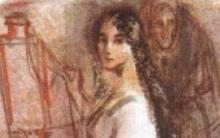
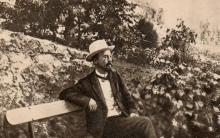
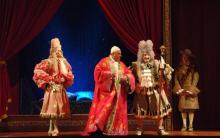
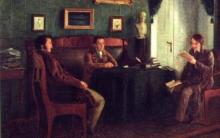
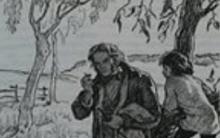




"Minor" (main characters)
There is nothing more courageous than victory over oneself War and peace victory over oneself arguments
Creative dictation based on the picture I
What is a watercolor tattoo?
Watercolor tattoo - the latest painting technique in the art of tattooing Flowers in the style of watercolor tattoo sketches